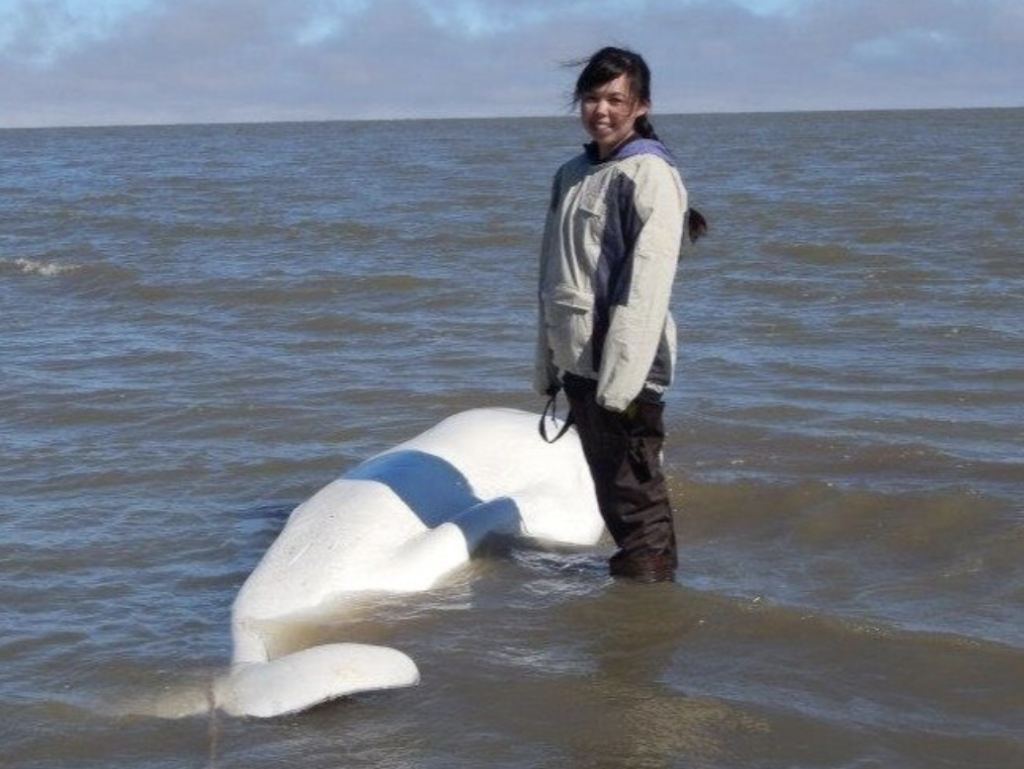Taking a holistic view of beluga health: Enooyaq Sudlovenick
By Heather Desserud
Enooyaq Sudlovenick is a first-year PhD student at the Centre for Earth Observation Sciences at the University of Manitoba, and a long-time member of ArcticNet, attending the last five years of conferences and actively participating in the Network. This year, the talented student researcher is giving back to the Network by serving as the ArcticNet Students’ Association President, while also embarking on a new chapter in her research career.
Enooyaq moved to Winnipeg this past year to begin her PhD on beluga health, previously earning her master’s at the veterinary program at the University of Prince Edward Island, and her undergraduate degree from the University of Guelph. Relocating to a city the size of Winnipeg is an adjustment compared with Charlottetown, Guelph or her hometowns of Pond Inlet and Iqaluit; while the pandemic has interrupted her opportunities to get to know the city, she is excited about her work and the chance to explore a new region.
“The Arctic research world is such a small place. You hear these names over and over, but once you meet them at ArcticNet, you feel like you’ve finally connected.”
— Enooyaq Sudlovenick, PhD student and ASA President
Enooyaq’s research focuses on integrating Western and Inuit methods of assessing whale health to produce a holistic approach to determining the health of beluga. The beluga is a valuable food source for many northern communities, who have raised concerns about the potential levels of mercury and other contaminants in whale tissue. The research team, led by supervisor Dr. Lisa Loseto, works with tissue samples collected from both harvested and tagged whales. These samples are analyzed at labs across the country to assess the contamination levels and other measurements.
Working with communities from the very beginning is a vital component to Enooyaq’s research. Inuit communities have developed a deep understanding of the health of the species they harvest, and it was their concerns around mercury levels that prompted the studies; by linking their knowledge with Western laboratory testing, researchers can achieve a more complete understanding of the health of beluga and other important Arctic marine species.

As the new ASA president, Enooyaq hopes to continue to share her passion for Arctic research and promote involvement with ArcticNet among new researchers and students. A member of the ASA for three years prior to taking on the helm, her goals as president centre the involvement of northerners in the Network. She aims to bring more northerners to Student Day, and spoke enthusiastically about the opportunity to train new students and researchers just getting started with community-based research. Bringing the North to ArcticNet events is a good warm-up for researchers who plan to travel to the North for their work; by ensuring that new students and researchers are sensitive to cultural differences, the Network can help to reduce the potential for miscommunication in working with northern communities.
“I’ve been to Arctic research events all over the world, but ArcticNet is the only event that makes a real, visible effort with real, visible results to get northerners attending. I love going—it always feels like the beginning of the holiday season.”
— Enooyaq Sudlovenick on ArcticNet’s annual meeting
When she concludes her PhD, Enooyaq plans to return to the North to research and teach; her dream is to be part of a university in Nunavut where she can train up a new generation of northerners in marine mammal research. It’s a dream that ArcticNet is proud to support.